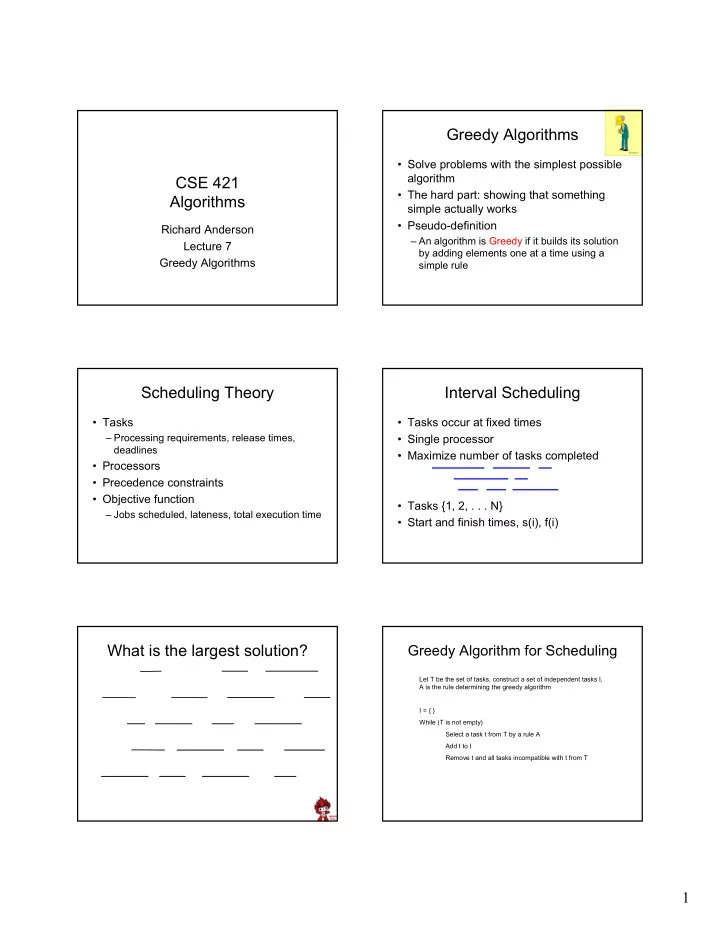

Greedy Algorithms • Solve problems with the simplest possible algorithm CSE 421 • The hard part: showing that something Algorithms simple actually works • Pseudo-definition Richard Anderson – An algorithm is Greedy if it builds its solution Lecture 7 by adding elements one at a time using a Greedy Algorithms simple rule Scheduling Theory Interval Scheduling • Tasks • Tasks occur at fixed times – Processing requirements, release times, • Single processor deadlines • Maximize number of tasks completed • Processors • Precedence constraints • Objective function • Tasks {1, 2, . . . N} – Jobs scheduled, lateness, total execution time • Start and finish times, s(i), f(i) What is the largest solution? Greedy Algorithm for Scheduling Let T be the set of tasks, construct a set of independent tasks I, A is the rule determining the greedy algorithm I = { } While (T is not empty) Select a task t from T by a rule A Add t to I Remove t and all tasks incompatible with t from T 1
Simulate the greedy algorithm for Greedy solution based on earliest each of these heuristics finishing time Schedule earliest starting task Example 1 Schedule shortest available task Example 2 Schedule task with fewest conflicting tasks Example 3 Theorem: Earliest Finish Algorithm Stay ahead lemma is Optimal • Key idea: Earliest Finish Algorithm stays • A always stays ahead of B, f(i r ) <= f(j r ) ahead • Induction argument • Let A = {i 1 , . . ., i k } be the set of tasks found – f(i 1 ) <= f(j 1 ) by EFA in increasing order of finish times – If f(i r-1 ) <= f(j r-1 ) then f(i r ) <= f(j r ) • Let B = {j 1 , . . ., j m } be the set of tasks found by a different algorithm in increasing order of finish times • Show that for r<= min(k, m), f(i r ) <= f(j r ) Completing the proof Scheduling all intervals • Let A = {i 1 , . . ., i k } be the set of tasks found by • Minimize number of processors to EFA in increasing order of finish times schedule all intervals • Let O = {j 1 , . . ., j m } be the set of tasks found by an optimal algorithm in increasing order of finish times • If k < m, then the Earliest Finish Algorithm stopped before it ran out of tasks 2
How many processors are needed Prove that you cannot schedule this set for this example? of intervals with two processors Depth: maximum number of Algorithm intervals active • Sort by start times • Suppose maximum depth is d, create d slots • Schedule items in increasing order, assign each item to an open slot • Correctness proof: When we reach an item, we always have an open slot Scheduling tasks Example Time Deadline • Each task has a length t i and a deadline d i 2 2 • All tasks are available at the start 3 4 • One task may be worked on at a time • All tasks must be completed Lateness 1 2 3 • Goal minimize maximum lateness – Lateness = f i – d i if f i >= d i 3 2 Lateness 3 3
To be continued . . . Determine the minimum lateness Time Deadline 6 2 3 4 4 5 5 12 4
Recommend
More recommend